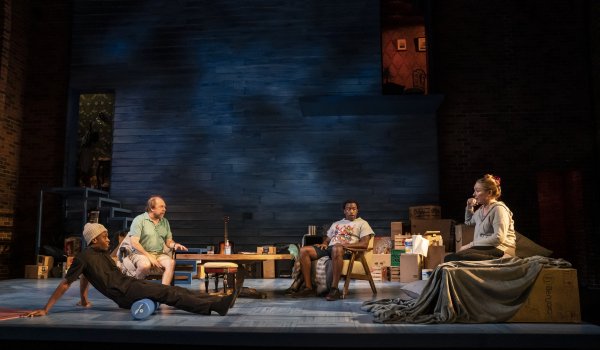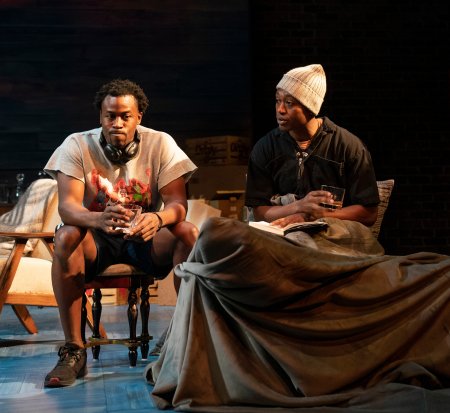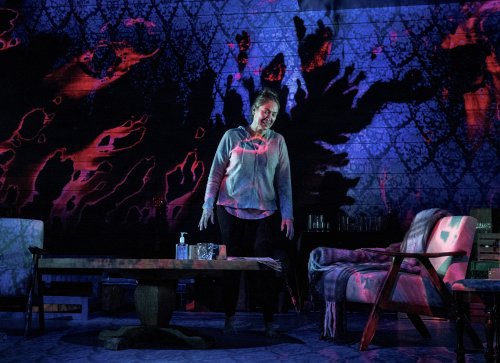Long Day’s Journey into Night
In updating Eugene O'Neill's masterpiece, director Robert O'Hara spares us too much of the journey.

Ato Blankson-Wood, Bill Camp, Jason Bowen and Elizabeth Marvel in a scene from the Audible Theater revival of “Long Day’s Journey into Night” directed by Robert O’Hara (Photo credit: Joan Marcus)
An essential aspect of being human involves using the past to illuminate the present and vice versa, twin efforts at the heart of director Robert O’Hara’s slimmed-down reimagining of Eugene O’Neill’s autobiographical masterpiece Long Day’s Journey into Night. Although the dysfunctional Tyrone family still resides in their Connecticut summer cottage, the bold O’Hara severely compresses the details of their bleak rotation away from the sun to about half the usual run time and shifts the story from 1912 to the almost-now. The rationale for these major changes is Covid with O’Hara seeing compelling thematic similarities between the Tyrones’ existential plight and our current pandemic catastrophe while, in reasonable deference to the latter, also concluding it’s still best to avoid spending four hours in a snug off-Broadway theater. Unfortunately, neither O’Hara’s practical nor artistic choices serve O’Neill’s play well enough to justify them.
Transporting a classic to a different historical point is certainly nothing new (hello, Shakespearean canon!) and is an adjustment that occasionally does revivify works that have grown stodgy through age and repetition. But O’Hara’s anachronistic flourishes have the opposite effect, bogging the Tyrones down in an era that only fitfully feels like it could be their own. A projected loop of CNN newscasts focused on the pre-vaccine Covid world, including the 2020 presidential election, quickly establishes the temporal jump along with some onstage props: FedEx and Amazon delivery boxes; a Starbucks bag; a yoga mat; smartphones; and face masks. The contemporary transition is also abetted by Clint Ramos’s casual costuming that swaps the play’s usual bourgeois fashions for sweats and shorts.

Bill Camp and Elizabeth Marvel in a scene from the Audible revival of “Long Day’s Journey into Night” directed by Robert O’Hara (Photo credit: Joan Marcus)
To be fair, this sartorial indifference and O’Hara’s other Covid conceits don’t completely fall flat in his version of Long Day’s Journey into Night, which, even in its traditional tellings, can seem like eavesdropping on a fragmenting family in lockdown: bubbling regrets, animosities, and psychological abuse mixed with drug addiction and alcoholism in a confined space. But, when it comes to this potent combination, it’s the story’s parental struggles that blend most smoothly into the here and now. As with O’Neill’s father, the Tyrone patriarch James (Bill Camp) is a penny-pinching actor who sacrificed his talent and ambition for material security while also ruining the life of his wife Mary (Elizabeth Marvel) through excessive drinking and self-centeredness. These are tragedies whose broad outlines will always resonate.
More provocatively, O’Hara turns Mary from a morphine junkie into an opioid one, though with the same root cause: a “quack” doctor promising an easy way to stop her pain after a difficult childbirth. Besides being an effective reminder of another continuing health crisis, it also creates an infuriating historical parallel between two horrific failures of the medical profession. O’Hara, however, doesn’t have enough faith in the sufficiency of this insight, instead gratuitously including several peek-a-boo demonstrations of Mary shooting up (judging by the spoon and flame, she’s apparently using heroin) on Ramos’ voyeuristic set while also relying on Yee Eun Nam’s surreal projections to overdramatize Mary’s descent into a deeper addiction. Not only do these images distract from Marvel’s wonderfully nuanced performance, unforgivably, they almost tip it into parody.

Jason Bowen and Ato Blankson-Wood in a scene from the Audible revival of “Long Day’s Journey into Night” directed by Robert O’Hara (Photo credit: Joan Marcus)
But the most conspicuous problem with O’Hara’s production concerns Edmund (Ato Blankson-Wood), the youngest Tyrone son, and his unspoken illness, which obviously is now Covid rather than the tuberculous O’Neill strongly suggests in the play (and suffered from himself). Of course, other than Edmund’s violent coughing, little in O’Neill’s remaining, or excised, text supports O’Hara’s diagnostic change, raising a host of questions that Blankson-Wood’s touching portrayal of the character can’t come close to addressing. Shouldn’t Edmund be quarantining away from his family? Shouldn’t Edmund be wearing a face mask, at least around his parents? Why isn’t anyone social distancing? Is Edmund’s family actually planning to send him to a Covid sanitarium? Is that even a thing?
Needless to note, O’Neill would not have possessed the faintest comprehension his work could inspire these questions, and, undoubtedly, O’Hara would prefer it if we did not dwell on them, either. But it’s difficult to forget all those CDC guidelines being flouted before our eyes, despite the talented cast’s valiant attempts to repress our too-fresh memories with performances that would have beautifully anchored a standard production of Long Day’s Journey into Night. Married in real life, Camp and Marvel immediately establish an affecting intimacy that they spend the rest of the play smothering with painful revelations, while Blankson-Wood and Jason Bowen, as Edmund’s dissolute older brother Jamie, present the type of sibling bond forged through an emotionally wrenching continuum of love and hate.

Elizabeth Marvel in a scene from the Audible revival of “Long Day’s Journey into Night” directed by Robert O’Hara (Photo credit: Joan Marcus)
But, again, O’Hara does these actors no favors, forcing them to contend with incongruous historical information while also depriving them of the greatest acting benefit O’Neill’s four-act play affords: time. The characters’ drawn-out, if not periodically downright tedious, interactions are fundamental to establishing the family dynamic and, more importantly, necessary for giving the work it’s much-needed oppressive weight. It’s nice that O’Hara wants to spare us from that suffering, but it doesn’t help the play.
Long Day’s Journey into Night (through February 20, 2022)
Audible Theater
Minetta Lane Theatre, 18 Minetta Lane, in Manhattan
For tickets, call 800-982-2787 or visit http://www.longdaysoffbroadway.com
Running time: two hours and five minutes with no intermission






Leave a comment